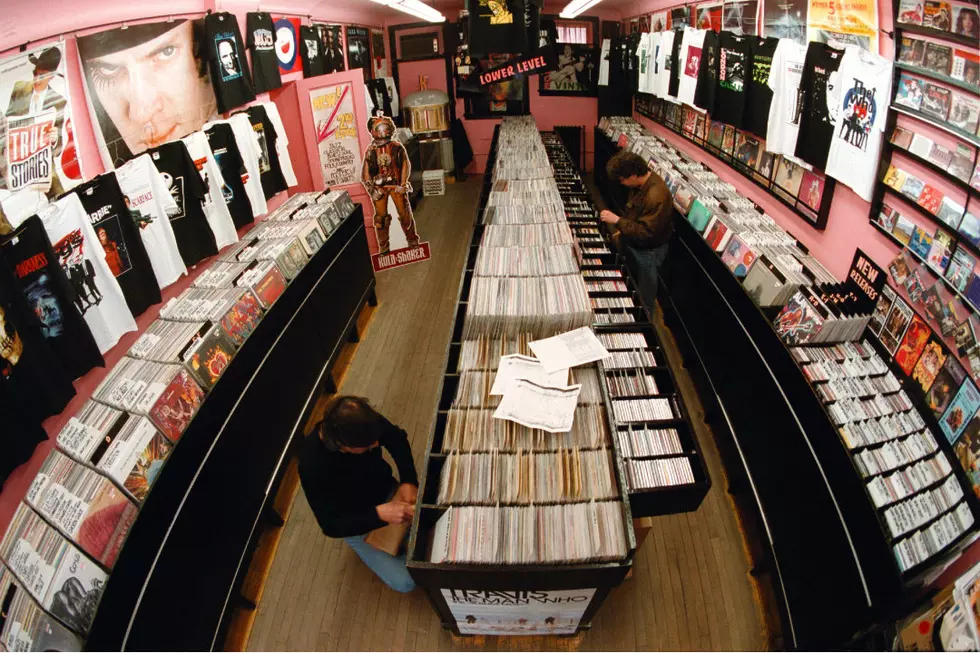
What Sells? Uniformity. What Sells? Uniformity. What Sells?
We've all said it: "I don't like [country, opera, rap, death metal]. It all sounds the same to me." Well, it turns out maybe we aren't music snobs so much as astute listeners.
Lenika Cruz recently reported in the Atlantic on a study out of the Medical University of Vienna, Austria (school motto: "Life is devoid of warmth and meaning, try the schnitzel"). Cruz states:
[The] scientists found that the more popular a musical style grew, the more generic it became—partly due to the glut of artists that flock to a burgeoning sound and the drop-off in innovation that tends to accompany demand.
The study looked at the "instrumentational complexity" of more than half-a-million albums from 1955 to 2011, across 15 genres and 374 styles as diverse as "hyphy," "viking metal," "acid jazz," and "Korean court music."
Your first thought is probably, "How dare they take a swipe at my beloved Korean court music," followed by a resounding, "Well yeah, duh." What seemed innovative yesterday is just another stage crowded with fiddle players screaming "Hey!" today.
A YouTube mash-up demonstrating just how uniform contemporary country has become went viral last week. Gregory Todd, a.k.a. Sir Mashalot, posted the following mix of six nearly identical country hits back in November. It's a remarkable piece of work:
Cynicism is the easy route here -- their music is cookie cutter, but my music isn't -- but the phenomenon permeates all genres. Here's a great list of songs based on the Bo Diddley beat, for example, and how many singers affected the Eddie Vedder sound after 'Ten' blew up?
Keep in mind that this study focused on "instrumentational complexity." The researchers looked at the use of 500 different instruments, defining songs using instruments common across multiple genres as "low complexity" and those that used a more unique array of instruments as "high complexity." Cruz continues:
At different points in time, styles such as "euro house," "disco," and "pop rock" decreased in complexity, but enjoyed higher average album sales, while "experimental," "alternative rock," and "hip hop" became more complex, but saw overall sales decline.
In other words, consumers punish innovation at the cash register, perhaps even while celebrating it in conversation. If this is true, where does innovation come from? Without a market driver, the labels have no motivation to change their product, yet all musical genres evolve over time.
Consumers punish innovation at the cash register, perhaps even while celebrating it in conversation.
This is purely speculation on my part, but I think that the labels do have an economic stake in innovation, provided that it comes from "gateway artists." These musicians fall into two categories: 1) the wildly popular; and 2) the not yet wildly popular.
Go back almost 50 years, to December 1965. The Beatles are the biggest band in the world. They're as close to a sure thing as an executive can hope for, so when George Harrison introduces the sitar in "Norwegian Wood," he's upping the instrumentational complexity of western pop music in what for the label is a no-risk scenario. A new release from the Fab Four is guaranteed money in the label's pocket.
Perhaps no other band of that era could have featured such an exotic instrument and not only had it accepted but embraced by its fans. That in turn led to its adoption by the pop music community. The sitar was ubiquitous by the end of the decade, popping up in tracks by everyone from Elvis to the Rolling Stones to the Monkees:
The other gateway scenario is equally low risk to the labels. One would be hard-pressed to find a more genre-changing sound in the last 15 years than the White Stripes, but Jack and Meg already had three albums under their white belts before signing with Richard Branson's V2 Records. In other words, the majors let the indie label Sympathy for the Record Industry absorb all of the risk inherent to Jack White introducing cheap plastic guitars to alternative music, then swooped in and reaped the benefits once the sound was codified.
We gravitate toward what we know, not just in music but in all aspects of our lives. Both psychologists and biologists refer to this phenomenon as homeostasis, which can be paraphrased as resistance to change unless it's introduced slowly. But change does come eventually, rendering today's "strange" songs tomorrow's standards.
So uniformity is built not just into the music industry but into our DNA. What's an adventurous music fan to do?
Challenge yourself. Maintain your regular diet of whatever it is you listen to, but sneak in something new on a regular basis. If you're an alt-indie fan, check out some funk. Classic rock fan? Sprinkle in a little Merle Haggard. No matter what you listen to, pick up some Frank Zappa. Hit one of the streaming services and check out some indie bands.
The labels will always serve up the exact same song with six different titles, but don't let that stop you from trying new things.
And don't forget to try the schnitzel. It's delicious.
More From Diffuser.fm









